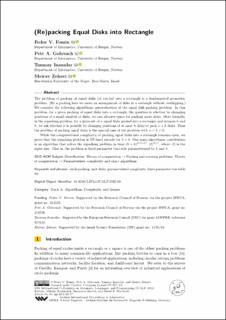(Re)packing Equal Disks into Rectangle
Journal article, Peer reviewed
Published version

Åpne
Permanent lenke
https://hdl.handle.net/11250/3042293Utgivelsesdato
2022Metadata
Vis full innførselSamlinger
- Department of Informatics [928]
- Registrations from Cristin [9791]
Originalversjon
Leibniz International Proceedings in Informatics. 2022, 229, 60:1-60:17. https://doi.org/10.4230/LIPIcs.ICALP.2022.60Sammendrag
The problem of packing of equal disks (or circles) into a rectangle is a fundamental geometric problem. (By a packing here we mean an arrangement of disks in a rectangle without overlapping.) We consider the following algorithmic generalization of the equal disk packing problem. In this problem, for a given packing of equal disks into a rectangle, the question is whether by changing positions of a small number of disks, we can allocate space for packing more disks. More formally, in the repacking problem, for a given set of n equal disks packed into a rectangle and integers k and h, we ask whether it is possible by changing positions of at most h disks to pack n+k disks. Thus the problem of packing equal disks is the special case of our problem with n = h = 0.
While the computational complexity of packing equal disks into a rectangle remains open, we prove that the repacking problem is NP-hard already for h = 0. Our main algorithmic contribution is an algorithm that solves the repacking problem in time (h+k)^𝒪(h+k)⋅|I|^𝒪(1), where |I| is the input size. That is, the problem is fixed-parameter tractable parameterized by k and h.
